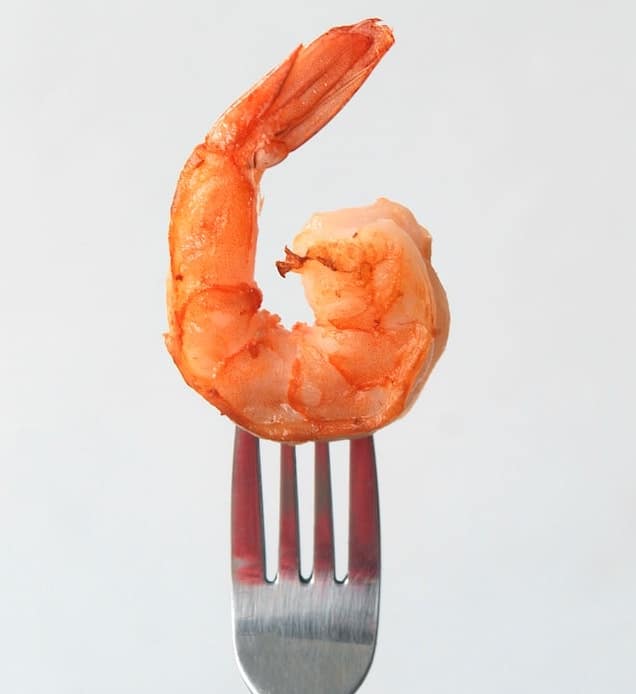
Fortunately, while chickens cannot survive on a diet consisting exclusively of shrimp and other seafood, there is no reason why they can’t enjoy eating these tasty morsels in moderation. So, yes, chickens can eat shrimp.
This blog post will discuss what types of shrimp are safe to give your chickens, how often they can eat them, and the potential health benefits of having your feathered friends dine on some succulent crustaceans.
Contents
Can Chickens Eat Shrimp? Yes!
Chickens are omnivores, which means they are able to eat both plants and animals, including certain types of seafood like shrimp.
While chicken diets typically consist of grains, seeds, vegetables (even mustard greens), and some fruits with occasional treats like insects or worms, feeding your flock good quality shrimp can offer some unique nutritional benefits that other feedstuffs cannot provide.
Let’s look at the nutrition offered by shrimps, how to serve them to your flock safely, the effects a shrimp diet may have on egg-laying and growth in chickens, and more!
Nutritional Benefits of Feeding Chickens Shrimp
Shrimps are an excellent source of protein, as well as several essential vitamins and minerals such as vitamins A, B12, iron, and zinc.
They also contain fatty acids, which can help support healthy skin and feather development in chickens.
Research has shown that shrimp meal is one of the most efficient sources of high-quality protein available for poultry feed, making it an ideal choice for anyone looking to give their chickens an extra boost of nutrition without having to purchase expensive supplements or additional feedstuffs.
Also see: Can Chickens Drink Milk?
How to Serve Shrimp to Your Flock
The best way to serve shrimp is cooked – raw shrimp can contain parasites that could be hazardous to your chickens’ health if ingested. You can even add fennel as it is known to help with digestion.
In addition, cooked shrimps should be cut into small pieces so that all members of your flock can easily consume them; you may even want to consider grinding them up before adding them to the rest of your flock’s regular feed.
Another option is to put whole cooked shrimp into a treat bowl dedicated solely for this purpose – make sure you clean it thoroughly after each use!
Related Post: Why Roosters Attack Hens & How To Deal With It
Acid-Treated Shrimp Meal: Is it Safe For Chickens?
Acid-treated shrimp meal is sometimes used as a cheap alternative when purchasing commercial poultry feeds.
However, there is some concern over its safety for chickens due to the potential presence of high concentrations of heavy metals such as lead or mercury in these products. Therefore, it is important to carefully research brands before using acid-treated shrimp meal on your flock and make sure that the product you choose has been tested for safety by an independent laboratory certified by national authorities such as the USDA or FDA.
This helps ensure that it meets strict standards regarding composition and purity levels.
What are the Effects of a Shrimp Diet on Egg-Laying And Growth In Chickens?
Feeding chickens a diet supplemented with shrimps can benefit their egg production; a study has shown that providing access to shrimp meal doesn’t significantly increase egg production compared with diets made solely of grains or other feedstuffs lacking essential trace elements found in marine products like shrimp meal.
On the other hand, yolk coloration improved!
Related: Why Do Chickens Lay Unfertilized Eggs?
Other research suggests that adding shrimp meal into chicken diets can promote better growth rates and improve overall reproductive performance when compared to traditional feeds made up only of grains or vegetable proteins alone.
So you can see that there is no definitive word on how shrimp affects chickens’ egg laying and growth rates. As is often the case, different scientists come up with different conclusions.
In Conclusion
It seems that feeding chickens shrimp can probably offer many unique nutritional benefits not provided by other common feedstuffs.
However, caution should always be taken when purchasing products containing acid-treated shrimp meals (or any other potentially hazardous ingredient) due to its potential dangers if not correctly handled or researched beforehand!
Still, with careful consideration and an eye towards safety measures, preparing meals or treats featuring these delicious crustaceans is nice for the chickens. And people get lovely fresh eggs with good yolk color too!
Photo by Fernando Andrade on Unsplash.

